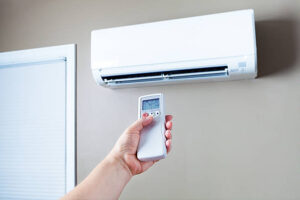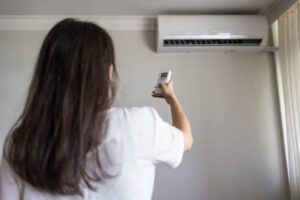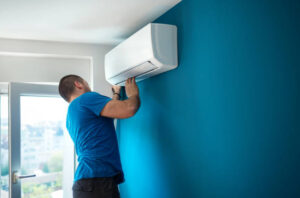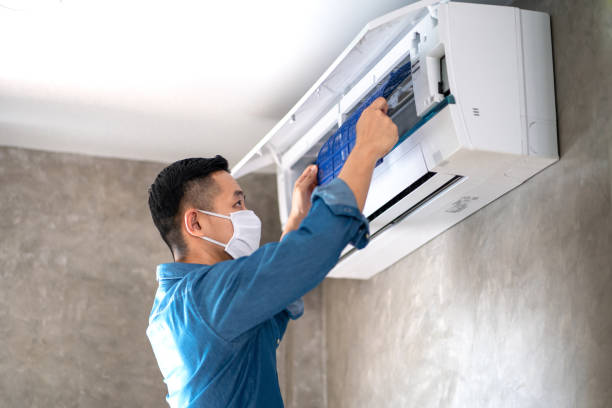Energy-efficient HVAC systems might sometimes be overshadowed by traditional heating and cooling solutions. Yet, they carve out their own space with unmatched efficiency and environmental friendliness. This unique appeal distinguishes most energy-efficient HVAC systems as a vital category on their own, offering an experience that aligns with both modern demands for sustainability and the need for cost-effective climate control.
Key types of energy-efficient HVAC systems include Geothermal Heat Pumps, Solar HVAC Systems, and Dual Fuel Systems, each renowned for their specific benefits. Single-stage and variable-speed models also stand out, providing options that range from consistent, single-speed performance to adaptable, energy-saving operations. Digging deeper, each type of energy-efficient HVAC system showcases its own set of advantages, innovative technologies, environmental impacts, and potential for savings.
The following sections will delve into these aspects in detail, offering a comprehensive understanding of why energy-efficient HVAC systems are an essential choice for those looking to reduce their carbon footprint and utility bills.
What is an energy-efficient HVAC system?

An energy-efficient HVAC system is crafted to use less energy to heat or cool a space. Unlike traditional systems, it leverages advanced technology to minimize electricity consumption while ensuring optimal indoor comfort. These systems incorporate innovative compressor technology, smart thermostat controls, and sometimes renewable energy sources like solar power, making them highly efficient.
This efficiency not only aids in reducing utility bills but also plays a significant role in lowering greenhouse gas emissions, contributing to a healthier planet. In summary, energy-efficient HVAC systems offer a sustainable and cost-effective solution for maintaining comfortable indoor temperatures, making them a preferred choice for both homes and businesses.
What Makes an HVAC System Energy Efficient?
Several key features set an energy-efficient HVAC system apart from traditional models. At the heart of these systems is the use of advanced compressor technology, which adjusts cooling and heating to precisely meet the needs of the space, avoiding the wasteful energy use common in less advanced systems. Programmable and smart thermostats represent another cornerstone, offering the ability to fine-tune temperature settings for different times of the day or specific areas of a building, ensuring energy isn’t squandered heating or cooling empty spaces.
Additionally, zoning systems contribute significantly by allowing individual control over different areas, making it possible to target the climate control efforts where they’re needed most. Collectively, these innovations not only lead to substantial energy savings but also help in reducing utility bills and promoting a greener environment.
Why are energy-efficient HVAC systems important?

Energy-efficient HVAC systems are pivotal for a multitude of reasons. Primarily, they reduce greenhouse gas emissions, playing a key role in environmental preservation and the fight against climate change. By optimizing energy use, these systems lessen the ecological footprint of heating and cooling operations.
Moreover, they lead to lower utility bills, providing significant financial benefits. The decreased energy consumption directly translates into cost savings, making energy efficiency not only an environmentally sound choice but also an economically advantageous one. Additionally, such systems are known to enhance indoor air quality and comfort, ensuring that indoor environments remain comfortable and healthy.
Through maintaining consistent temperature and humidity levels, they improve the livability of spaces. Collectively, these aspects highlight the critical importance of energy-efficient HVAC systems in fostering a sustainable, cost-effective, and comfortable future.
Reduces Greenhouse Gas Emissions
Energy-efficient HVAC systems significantly reduce the amount of greenhouse gas emissions. By optimizing energy use, they contribute to lessening the environmental impact, playing a pivotal role in the global effort to combat climate change.
Lowers Utility Bills Significantly
A direct benefit of energy-efficient HVAC systems is their ability to lower utility bills. Thanks to their efficient use of energy, these systems demand less power to achieve the desired indoor climate, resulting in substantial financial savings over time.
Enhances Indoor Air Quality and Comfort
Moreover, energy-efficient HVAC systems are designed to improve indoor air quality and enhance comfort. By maintaining stable temperature and humidity levels and incorporating advanced filtration technologies, they ensure a healthier and more comfortable environment for occupants.
How do energy-efficient HVAC systems work?
Energy-efficient HVAC systems harness advanced technologies to significantly reduce energy consumption while still providing optimal indoor comfort. At their core, these systems feature advanced compressor technology that dynamically adjusts heating and cooling output to match the specific needs of the space, ensuring that energy is utilized as efficiently as possible. Programmable and smart thermostats play a pivotal role by offering precise control over temperature settings, adapting to both occupancy and personal preferences to avoid unnecessary energy use.
Furthermore, zoning systems enhance efficiency by allowing individual control of different areas, focusing energy on spaces in use and avoiding wastage on vacant ones. Collectively, these technologies enable energy-efficient HVAC systems to operate more effectively, leading to reduced energy usage and a smaller environmental footprint.
Utilizes Advanced Compressor Technology
Energy-efficient HVAC systems leverage advanced compressor technology to dynamically adjust cooling and heating levels. This sophisticated approach ensures that the system operates only at the required capacity, significantly reducing energy consumption and enhancing overall efficiency.
Employs Programmable and Smart Thermostat Controls
A cornerstone of energy efficiency in HVAC systems is the use of programmable and smart thermostat controls. These innovative tools allow for precise temperature management, enabling users to customize heating and cooling schedules according to their needs, thus ensuring optimal comfort without unnecessary energy use.
Incorporates Zoning Systems for Targeted Heating and Cooling
Zoning systems further refine the efficiency of HVAC systems by enabling targeted heating and cooling of specific areas within a building. This tailored approach ensures that energy is directed exactly where it’s needed, minimizing waste and maximizing comfort in occupied spaces.
What are the types of energy-efficient HVAC systems?

In the quest for sustainability and efficiency, several energy-efficient HVAC systems have emerged, each with unique mechanisms and benefits. Geothermal Heat Pumps utilize the stable temperatures found underground to efficiently heat and cool buildings, making them a standout choice for energy conservation. Solar HVAC Systems leverage photovoltaic panels to capture solar energy, transforming it into electricity that powers the heating and cooling operations, thus drastically reducing dependency on conventional energy sources.
Dual Fuel Systems offer a versatile solution by combining gas and electric heating to optimize efficiency, automatically switching between the two based on which is most cost-effective under current conditions. These diverse systems represent the forefront of energy-efficient technology in HVAC, offering tailored solutions to meet the varying needs of users while significantly reducing environmental impact.
Geothermal Heat Pumps Using Underground Temperatures
Geothermal heat pumps harness the earth’s consistent underground temperatures to efficiently heat and cool spaces. This approach leverages the thermal stability found beneath the surface to reduce energy consumption and provide a green, sustainable alternative for year-round climate control.
Solar HVAC Systems Powered by Photovoltaic Panels
Solar HVAC systems employ photovoltaic panels to capture sunlight and convert it into electrical energy. This renewable energy source powers the heating and cooling operations, making solar HVAC systems a pinnacle of efficiency and environmental stewardship by slashing fossil fuel use and associated emissions.
Dual Fuel Systems Combining Gas and Electric Heating
Dual fuel systems blend the efficiency of gas and electric heating to create a versatile climate control solution. By intelligently switching between gas and electric power based on which is more efficient under current conditions, these systems optimize energy use, ensuring cost-effective and adaptable heating.
Related Content: CENTRAL AIR CONDITIONER TYPES: FIND THE PERFECT FIT FOR YOUR HOME OR BUSINESS
How to choose the right energy-efficient HVAC system?
Selecting the ideal energy-efficient HVAC system requires careful consideration of several critical aspects to ensure it meets your needs for efficiency, comfort, and sustainability. First, evaluating square footage and home layout is essential; the size and configuration of your space will greatly influence the system’s efficiency and effectiveness. Next, considering the local climate and seasonal temperatures is crucial for choosing a system that can handle your specific heating and cooling demands efficiently.
Finally, balancing initial costs with long-term savings is key. Although energy-efficient systems may come with a higher upfront price tag, the substantial savings on utility bills and the positive environmental impact make them a worthwhile investment over time. By thoughtfully analyzing these factors, you can select an HVAC system that not only reduces energy consumption but also enhances comfort and aligns with your financial goals.
Evaluating Square Footage and Home Layout
Evaluating the square footage and layout of your home is a foundational step in choosing an energy-efficient HVAC system. The system’s capacity needs to align with the size of the space and its unique characteristics, such as ceiling heights and window locations, to ensure efficient heating and cooling without energy waste.
Considering Local Climate and Seasonal Temperatures
Selecting the right HVAC system also involves considering the local climate and seasonal temperatures. Systems that are tailored to your specific environmental conditions can achieve higher efficiency, providing optimal comfort during both hot summers and cold winters while conserving energy.
Balancing Initial Costs with Long-Term Savings
A critical aspect of the selection process is balancing the initial costs with long-term savings. Energy-efficient HVAC systems often come with a higher upfront cost but can lead to substantial savings on utility bills over time. Assessing the long-term financial benefits alongside the initial investment can guide you to a cost-effective and sustainable choice.
What are the installation considerations for energy-efficient HVAC systems?

When it comes to installing an energy-efficient HVAC system, several key factors must be taken into account to ensure the system operates at peak efficiency. Conducting a professional energy audit is a critical first step, as it helps to understand the energy dynamics of a building and identifies opportunities for efficiency enhancements. Equally important is the assessment and upgrading of existing ductwork.
Properly sealed and insulated ducts are essential for minimizing energy loss. Lastly, being aware of and adhering to local codes and obtaining the necessary permits is crucial for a compliant and safe installation. Addressing these considerations meticulously can lead to significant improvements in comfort, energy savings, and system performance.
Need for a Professional Energy Audit
A professional energy audit is a critical first step in optimizing the energy efficiency of a building. It provides a detailed analysis of how energy is used and identifies specific areas where improvements can lead to significant energy savings. This audit forms the foundation for selecting and installing an energy-efficient HVAC system tailored to the building’s unique requirements.
Assessing and Upgrading Existing Ductwork if Necessary
Ensuring the efficiency of existing ductwork is paramount for the successful operation of an energy-efficient HVAC system. Assessing and, if necessary, upgrading ductwork to eliminate leaks and improve insulation is essential. Properly sealed and insulated ducts minimize energy loss, enhancing the overall efficiency and performance of the HVAC system.
Understanding Local Codes and Obtaining Necessary Permits
Navigating local codes and securing the necessary permits is an essential part of the HVAC installation process. Compliance with local regulations ensures that the system meets safety and efficiency standards, protecting occupants and the environment. Obtaining the right permits is a crucial step that facilitates a smooth installation process and ensures legal compliance.
How to maintain an energy-efficient HVAC system?
Maintaining an energy-efficient HVAC system is essential for its effectiveness and longevity. Conducting bi-annual professional maintenance checks is crucial for early detection and resolution of any issues, ensuring the system operates at peak efficiency. Regularly changing air filters every 1-3 months is another key practice; clean filters prevent airflow blockages that can reduce efficiency and strain the system.
Additionally, performing seasonal inspections before peak usage times prepares the system for efficient operation during periods of high demand. Adhering to these maintenance steps helps in preserving air quality, maximizing energy savings, and extending the system’s lifespan, all while supporting environmental sustainability.
Setting a Bi-annual Professional Maintenance Check
Establishing a routine for bi-annual professional maintenance checks is key to the ongoing efficiency and reliability of an energy-efficient HVAC system. These checks allow experts to assess and address any issues, ensuring the system operates at its best year-round.
Changing Air Filters Every 1-3 Months
The practice of changing air filters every 1-3 months is vital for sustaining the system’s efficiency and the quality of indoor air. Regular replacement of filters prevents the buildup of dust and debris, which can hinder airflow and strain the system, leading to increased energy use and reduced performance.
Performing Seasonal Inspections Before Peak Usage Times
Performing seasonal inspections before peak usage times is essential for ensuring the HVAC system is prepared to handle increased demand efficiently. These inspections can identify any adjustments or repairs needed to optimize performance, helping to maintain comfort while controlling energy costs.
In Summary
Energy-efficient HVAC systems represent a pivotal advancement in both environmental sustainability and cost-effective climate control. By leveraging advanced technologies and renewable energy sources, these systems significantly reduce greenhouse gas emissions and utility bills while enhancing indoor comfort. As we move towards a greener future, adopting energy-efficient HVAC solutions is not just a smart choice but a necessary one.
Take the first step towards a sustainable and comfortable living environment by exploring most energy-efficient HVAC options today at Callidus Air.

